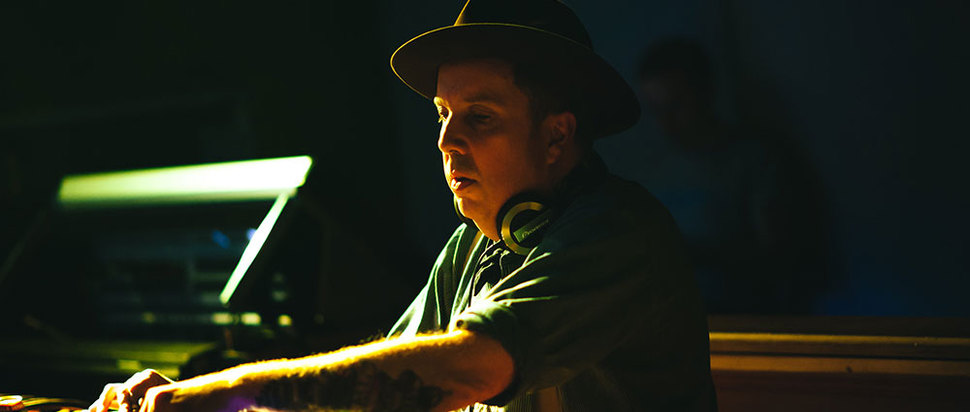Andrew Weatherall obituary: The DJ world loses its Guv’nor
Arguably the most complete artist to emerge from the acid house era, DJ, producer and remixer Andrew Weatherall died earlier this week, aged 56. We look back on his legacy
Despite being born and raised in Berkshire, Andrew Weatherall was responsible for producing one of the greatest Scottish albums of all time in Screamadelica, Primal Scream’s era-defining instant classic. While it will undoubtedly go down as his crowning glory, this was but one exciting chapter in the story of a musical visionary who changed the game forever. Weatherall died on Monday morning (17 Feb) after his admission to Whipps Cross hospital in London with a pulmonary embolism.
After spending much of the 80s in post-punk bands, his first meaningful foray into the dance music world came after a chance encounter with Danny Rampling. Hearing him spin a Chris & Cosey record at a house party, the Balearic flag-bearer installed Weatherall as resident at his legendary Shoom club night, igniting a lifelong love affair with club culture in the process. The pair, along with Terry Farley, Cymon Eckel and Steve Mayes, would go on to form Boy's Own, a music and fashion fanzine that captured the nascent British acid house scene in all its glory.
Demonstrating a keen cultural awareness through his writing and DJing, it was from here that Weatherall was approached by Creation Records with regards to producing the new Primal Scream album, despite the fact he had never once been behind a mixing desk. Armed with what he later described in an interview with the BBC as the “confidence of ignorance”, he produced seven of the eleven tracks on what would become Screamadelica. A Mercury Prize-winning masterpiece, widely hailed as Primal Scream’s finest work, it was a record that shaped a generation, bridging the previously disparate worlds of acid house, rock'n'roll, post-punk and psychedelia.
At this stage Weatherall made a conscious decision to sidestep the fame that could have easily propelled him to household name status. This involved turning down a string of eye-wateringly lucrative deals to work with some of the world’s biggest bands, instead declaring: “I’ll only work on tracks I like by bands I’m into. If a band sound like wankers, I won’t work with them.”
He expressed a similar indifference towards the superstar DJ phenomenon that emerged in the mid-90s, a trend that actually inspired him to become more leftfield and experimental while many of his contemporaries were selling out and embarking on stadium tours. “It was very tempting, because the money to be made and the larks to be had were manifold,” he recalled in an interview with The Guardian in 2016. “But call me unambitious, I was fine as I was. I’m quite happy at this level. When it becomes a career, a career in any business looks quite tiresome and vexing and like it might involve me having meetings with people I don’t want to have meetings with.”
As prolific as anyone in the electronic music world, Weatherall’s back catalogue of projects and aliases is an embarrassment of riches that would put most record labels to shame. Forming three-piece electronic trio The Sabres of Paradise upon leaving the Boy's Own crew, he would release further music as Two Lone Swordsmen (with Keith Tenniswood aka Radioactive Man), Blood Sugar (with David Harrow) and The Asphodells (with Timothy J Fairplay), among others – all while DJing up and down the UK and beyond most weekends.
It’s his remix work under the aforementioned aliases that will be remembered most fondly, with dozens of his edits – of artists ranging from My Bloody Valentine, Björk and Saint Etienne to The Future Sounds of London, Ricardo Villalobos and Leftfield – worthy of a mention whenever the conversation turns to ‘best ever remix’. More recently, A Love From Outer Space – the party he ran with fellow chug enthusiast Sean Johnston that never plays tracks faster than 122 BPM – occupied most of his time.
Perhaps the saddest thing about his untimely passing is the fact that he clearly had so much more to offer, musically and otherwise. Where Rampling, Farley and the rest of the Boy's Own crew have faded into cultural insignificance, Weatherall’s ebullient musical passions shined bright until the very end. As Weatherall's longtime friend and collaborator Irvine Welsh said in a Twitter post earlier in the week: “Genius is an overworked term but I'm struggling to think of anything else that defines him."
He is survived by his partner Elizabeth Walker, his father and his brother Ian.
